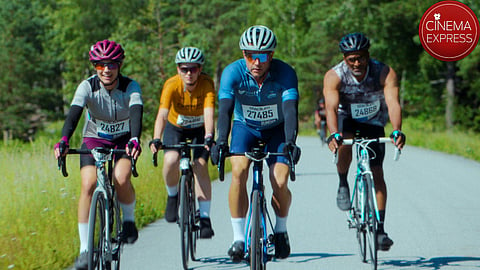Off Track 2 Movie Review: Not enough novelty to warrant this follow-up
Off Track 2 Movie Review(2.5 / 5)
Off Track 2 (Ute och cyklar) reunites the cast and crew for a second time, with some minor additions thrown in. As a standalone film (having no knowledge of part 1), it does more than okay, presenting characters battling apparent mid-life crises by enrolling in sporting competition. When viewed side-by-side with its original, part 2 chooses to remain safe, failing to venture beyond the scope of its familiar subject matter. So much so, it feels like an extended version of the predecessor. It may be set three or four years after the events of Off Track, but the big picture is pretty much the same. Siblings Lisa (Katia Winter) and Daniel (Fredrik Hallgren) are both channelising their energy into a race to deal with their respective problems, maybe even run from them. It was the 90-km Vasaloppet ski race in part 1, it is the 192-mile Vätternrundan recreational bicycle ride in part 2. Lisa is perhaps the only primary character to have exhibited enough growth to warrant a sequel. Sober and more focussed, she maintains a healthy bond with her daughter. Her relationship with policeman, Anders (Ulf Stenberg), is steady, with the latter having plans to take things to the next level. But the thought of such serious commitment cannot be easy. Daniel and Klara (Rakel Wärmländer) are now parents to a toddler and consult a therapist for their marital problems, but the rut they are in seems not have changed in the slightest. Daniel’s anally-retentive personality and Klara’s wish for basic spontaneity are still very much at odds. Their circumstances may be a tad different, but the issues are the same. Lisa and Daniel train hard for a massive communal bike race around Lake Vättern, hoping that the experience will lead to some much-needed clarity in their personal life. They train together, with Daniel’s goal-oriented nature obsessed with cracking the sub-nine-hour mark come race day.
Director: Mårten Klingberg
Cast: Katia Winter, Fredrik Hallgren, Rakel Wärmländer, Ulf Stenberg, Alexander Karim
Streamer: Netflix
Acted, directed and written decently, Off Track 2 banks on tackling problems rooted in lived experience. But it doesn’t offer enough in terms of something new. Lisa is the most changed character, having shown a sustained willingness to grow, but her brother, Daniel, remains at square one. The issues plaguing him and Klara are no different this time around, either. They have a baby now, so the recurring relationship issues are perhaps even more pronounced. The public sporting competition trope is central to both stories, with the hope that that event will turn into some sort of lifesaver for the characters. The formula for each part is so similar that the film feels like an extension, not a sequel. Introducing temptation in the form of Lisa’s old flame, Calle (Alexander Karim), a carefree DJ from her partying days, isn’t enough for the conception of a whole new part. It isn’t surprising that almost everyone gets roped in to attempt the Vätternrundan in one way or another.
Though the acting is relatable and real (much like its predecessor), the main question to be asked is whether a sequel was even needed. The objective of a follow-up is to take the story forward, either through plot, character or both. By that yardstick, it fails to qualify, as the central premise (of a big, sporting event being used as a crutch for perspective) remains unchanged. In a sense, this is one of those sequels that doesn’t really require a viewer to be acquainted with the events of part 1. An insecure fiancé, a former flame, and a confused lead aren’t quite enough to give part 2 a novel spin. What it does feel like, for the long and short of it, is that one track was replaced for another in the writers’ room, with the overall story remaining more or less in the same place. Developing Daniel’s character a bit more, as in the case of his sister, may have been the way to go. Off Track 2, by itself, is not a bad film. When viewed in conjunction with the original, it begs the question – was there a need for a follow-up, at all?

